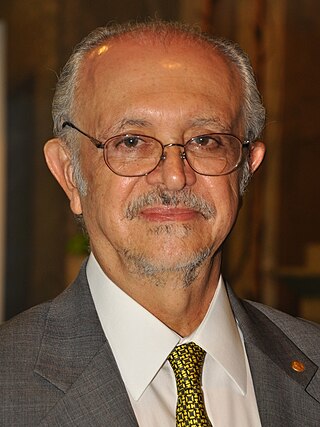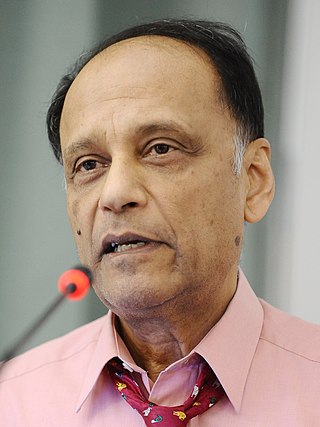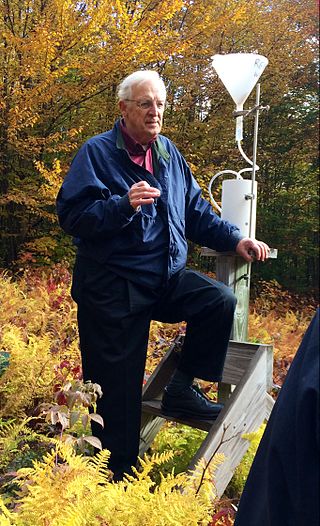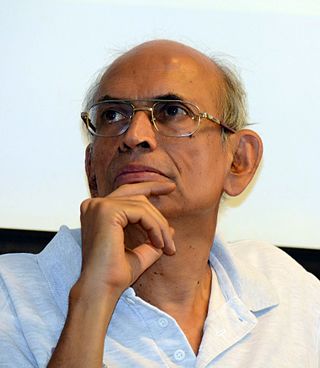ESPCI Paris is a prestigious grande école founded in 1882 by the city of Paris, France. It educates undergraduate and graduate students in physics, chemistry and biology and conducts high-level research in those fields. It is ranked as the first French École d'Ingénieurs in the 2017 Shanghai Ranking.

Mario José Molina Henríquez was a Mexican physical chemist. He played a pivotal role in the discovery of the Antarctic ozone hole, and was a co-recipient of the 1995 Nobel Prize in Chemistry for his role in discovering the threat to the Earth's ozone layer from chlorofluorocarbon (CFC) gases. He was the first Mexican-born scientist to receive a Nobel Prize in Chemistry and the third Mexican-born person to receive a Nobel prize.

Sir Partha Sarathi Dasgupta is an Indian-British economist who is Frank Ramsey Professor Emeritus of Economics at the University of Cambridge, United Kingdom, and a fellow of St John's College, Cambridge.

Ashok Gadgil Is the Andrew and Virginia Rudd Family Foundation Distinguished Chair and Professor of Safe Water and Sanitation at the University of California, Berkeley. He is a Faculty Senior Scientist and has served as director of the Energy and Environmental Technologies Division at Lawrence Berkeley National Laboratory.

Gene Elden Likens is an American limnologist and ecologist. He co-founded the Hubbard Brook Ecosystem Study at the Hubbard Brook Experimental Forest in 1963, and founded the Cary Institute of Ecosystem Studies in Millbrook, New York in 1983.

Madhav Dhananjaya Gadgil is an Indian ecologist, academic, writer, columnist and the founder of the Centre for Ecological Sciences, a research forum under the aegis of the Indian Institute of Science. He is a former member of the Scientific Advisory Council to the Prime Minister of India and the Head of the Western Ghats Ecology Expert Panel (WGEEP) of 2010, popularly known as the Gadgil Commission.
James William MacNeill, OC was a Canadian consultant, environmentalist, and international public servant.

The Eureka Prizes are awarded annually by the Australian Museum, Sydney, to recognise individuals and organizations who have contributed to science and the understanding of science in Australia. They were founded in 1990 following a suggestion by science journalist Robyn Williams.

Presented annually since 1991, the Stockholm Water Prize is an award that recognizes outstanding achievements in water related activities. Over the past three decades, Stockholm Water Prize Laureates have come from across the world and represented a wide range of professions, disciplines and activities in the field of water.

The Heinz Awards are individual achievement honors given annually by the Heinz Family Foundation. The Heinz Awards each year recognize outstanding individuals for their innovative contributions in three areas: the Arts, the Economy and the Environment. The award was established in 1993 by Teresa Heinz, the chairwoman of the Heinz Family Foundation, in honor of her late husband, U.S. Senator H. John Heinz III. The Heinz Award is considered to be among the largest individual achievement prizes in the world.
The Eni Award is a prize awarded by the Italian oil and gas company Eni with the aim of encouraging better use of energy sources and increased environmental research. The strict award guidelines and the notable names on the selection committee make Eni a coveted award. List of Eni award winners include Nobel laureates like Harold W. Kroto and Alan Heeger.
David William Schindler,, was an American/Canadian limnologist. He held the Killam Memorial Chair and was Professor of Ecology in the Department of Biological Sciences at the University of Alberta in Edmonton, Alberta. He was notable for "innovative large-scale experiments" on whole lakes at the Experimental Lakes Area (ELA) which proved that "phosphorus controls the eutrophication in temperate lakes leading to the banning of phosphates in detergents. He was also known for his research on acid rain. In 1989, Schindler moved from the ELA to continue his research at the University of Alberta in Edmonton, with studies into fresh water shortages and the effects of climate disruption on Canada's alpine and northern boreal ecosystems. Schindler's research had earned him numerous national and international awards, including the Gerhard Herzberg Gold Medal, the First Stockholm Water Prize (1991) the Volvo Environment Prize (1998), and the Tyler Prize for Environmental Achievement (2006).

Antje Boetius is a German marine biologist. She is a professor of geomicrobiology at the Max Planck Institute for Marine Microbiology, University of Bremen. Boetius received the Gottfried Wilhelm Leibniz Prize in March 2009 for her study of sea bed microorganisms that affect the global climate. She is also the director of Germany's polar research hub, the Alfred Wegener Institute.

Paul T. Anastas is an American scientist, inventor, author, entrepreneur, professor, and public servant. He is the Director of Yale University's Center for Green Chemistry and Green Engineering, Previously he served as the Science Advisor to the United States Environmental Protection Agency as well as the Agency's Assistant Administrator for Research and Development, appointed by President Barack Obama.

Johan Rockström is a Swedish scientist, internationally recognized for his work on global sustainability issues. He is joint director of the Potsdam Institute for Climate Impact Research (PIK) in Germany, together with economist Ottmar Edenhofer. Rockström is also chief scientist at Conservation International. He is Professor in Earth System Science at the University of Potsdam and Professor in Water Systems and Global Sustainability, Stockholm University.
The Blue Planet Prize recognises outstanding efforts in scientific research or applications of science that contribute to solving global environmental problems. The prize was created by the Asahi Glass Foundation in 1992, the year of the Rio Earth Summit, and since then the foundation has awarded the prize to two winners every year. In 2012, twenty of the Blue Planet Prize winners collaborated on a joint paper that was launched at the UN Environment Programme's Governing Council meeting in Nairobi on 20 February.
Xuemei Bai (白雪梅) is a professor of Urban Environment and Human Ecology at the Australian National University. She was the winner of the 2018 Volvo Environmental Prize, and is an elected fellow of the Academy of the Social Sciences in Australia.

The VinFuture Prize is an annual international award that honors remarkable scientific breakthroughs and promotes innovations for mankind, with involvement from scientists, policymakers, business leaders, and prize holders.












